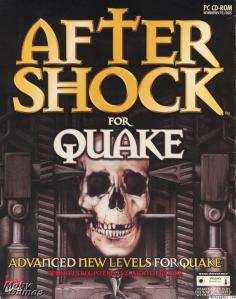Stop Killing Gaming – Part 2: Stop Bad DLC
My first blogging foray into gaming resulted in not only a relatively huge and positive reaction, but at the time a record-shattering 138 readers. This record still stands as the second most visited day for my blog. For comparison, every day before averaged between 30 and 45 readers.
As a blogger—and I use that word purposefully and in place of writer—I consider it my job to keep writing things that people want to read. While I’m happy to regale you all with how Old Spice earned my loyalty and why I hate Miller Lite—all because of commercials—but these trends tell me that you want to read about gaming. So be it.
That isn’t a declaration that I’m changing to write only about gaming. But that article about Call of Duty was meant to be a one-off thing. There are literally hundreds or thousands of places you can go to read opinions about video games, I sort of figured nobody would care what I had to say about it. In this case, I’ll admit happily that I was wrong.
At this point, that one-off article is probably going to become a fairly standard series for a short while. Beyond this post, I’ve got at least two more planned discussing how gaming is changing for the worst, and what we the gamers need to do about it. Now, before anybody accuses me of just pandering to the audience, I respond with two points. First, if I don’t blog about things important to my readership then, clearly, I’m not going to have readers. Second, I am passionate about video games, so this isn’t like I’m picking it out of thin air. I play games, love games, and have been strongly disappointed by gaming as a whole lately.
Anyway, my last entry on gaming saw me lambasting the players of games like COD—and its over nine thousand clones—for killing gaming. I think, though, that we need to be fair and look at the gaming industry because they are, quite ironically, the ones who are probably doing the most damage to gaming. Now at its heart this is still an issue of “stop being such easy targets for this”, but part of it is the game developers and publishers trying to pawn this off on you in the first place.
Throughout this article I will refer heavily to Mass Effect and Oblivion. Though these are the two games that illustrate the points about DLC best for me, there are many other examples out there of the good and bad parts of DLC.
The Good Thing about DLC
Prior to the advent of DLC there were two options if you wanted to add more to your games, you either created a full-blown expansion or you didn’t do anything. Mostly this was because there was no reliable distribution medium (i.e. widespread broadband internet connections) by which they could give you small packages of information. Additionally, it was costly to produce a disc that would contain only a few items and distribute it widely.
As such, most of what we saw were those full-blown expansions, often priced at about half to two-thirds the price of the original game and having just about the same amount of content included. These could be more maps (for multiplayer games) or more single-player levels. No matter, there was always a fair amount of content on the disc.
With the advent of broadband internet and consoles that came with those connections built in there was the opportunity for a new distribution medium. Slowly we saw games get additional content, often in the form of map packs for multiplayer games. As time went on, the developers realized they could use this for more than just cosmetic updates to games, but could include additional, meaningful content.
That is what DLC is all about: it’s about getting additional content that isn’t
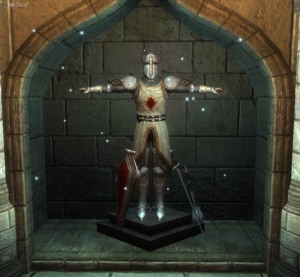
Who cared about the quests, that armor was badass. Probably the only reason anybody bought Knights of the Nine.
big enough to justify an expansion, but is still significant. DLC allows, at its core, the gamer to totally customize his gaming experience, choosing weapon or map packs at will that he can modify his experience with. In the case of games like Rock Band and Guitar Hero, the downloadable songs added new life to the game, given that most people played through each song about twenty times beforehand anyway.
At its heart, DLC is a concept that could offer some significant advantages over the traditional expansion pack model for games. Consider, for example, the Knights of the Nine DLC for Oblivion. Total gameplay added by this expansion was probably in the few hours mark, but it also added new armor, a new faction and a few other things to the game. On its own this would not stand as a feasible expansion, as it wasn’t big enough. But it certainly added more to the game that, for a reasonable price, gamers could choose to play if they still loved Oblivion but had played through it three times.
The Problems with DLC
Let me make clear from the start that I have a very specific view of DLC: the only form of DLC that should exist is that which adds non-essential, cosmetic or weapon upgrades to the game. I firmly believe that if the developers and publishers want to add story content to the game they should do so as full expansion pack or, in the cases of smaller DLC–like some that I will discuss–as a free upgrade. I realize this is not totally feasible, but I’ll at least explain why I think that.
To sum up the problems with DLC I need only say this: Oblivion horse armor. Fans of Oblivion will probably remember this, as it caused a bit of an outcry among gamers at the time. For $2.50 Bethesda added the ability to armor your horse into the game. You did not get meaningful quests (there was one breadcrumb quest that led you to the armorer, if you call that content); you did not get anything besides a cosmetic change to your probably-dead horse.
In case you’re wondering why that’s an argument against DLC, consider that Bethesda clearly released this expecting that people would want it. Additionally, the armor gave some survivability to your horse, something they did not possess at all in the original game. (I think on my first play-through I must have gone through 20 horses.) In other words, this is something that most people felt should have been in the game in the first place, not as an additional DLC.
But I think that Mass Effect 2 displays the problems with DLC most prominently. ME2 released numerous DLC packs that included additional party members, weapons, armor and even essential parts of the story. Assuming you didn’t buy ME2 for the PS3 (those bastards got half this stuff free) and you bought every DLC available, you’d end up spending an additional $45. The total cost to play ME2 and get the whole experience would be around $95, assuming you bought it at or near release.

When I first saw Admiral Hackett in ME3 I had no damn clue who he was. I didn't play arrival, so I had no clue why he was suddenly super important.
Now I know many of you are pointing out that you don’t have to buy any of the DLC. This is a point that I, for the most part, would agree with. That said, what about Lair of the Shadow Broker and Arrival, the two DLC packs for ME2 that you essentially had to play?
I did not purchase either of those DLC packs and, really, knew little about them. When I popped Mass Effect 3 in my computer I didn’t even think about that—until the game actually started. ME3 picks up from where Arrival left off, and it refers to it almost exclusively for the first ten minutes of the game. If you didn’t buy Arrival then screw you, because you’re just going to have to figure out what happened.
And this, I think, is the best argument against DLC. When it becomes necessary to buy it to experience the game fully. While the Mass Effect series is a little unique, in that it’s a trilogy, the precedent has been set that you can include necessary parts of the story as DLC and people won’t call you out on it. Compare this to, say, the way that the Clone Wars animated series interacts with the prequel Star Wars trilogy. Imagine if George Lucas had made it necessary to watch those to understand what happened in Revenge of the Sith, and he charged you extra to do it. You’d probably be pissed.
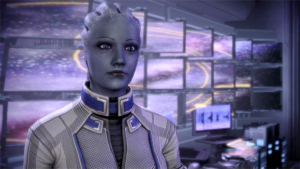
"Liara, why do you have all this spy equipment? And why do you keep referring to yourself as the Shadow Broker?"
In effect, if you want to truly understand Mass Effect 3 you have to buy Mass Effect 2 and those DLC for an additional $15. That means your total necessary cost to understand the series is somewhere around $200. (That’s $60 per game, assuming you buy them at release—which if you loved Mass Effect you probably did—and then $15 for the two important DLC.)
Some of you probably don’t see the problem with that, but I consider it releasing an incomplete game. There were other DLC packs for ME2 that included characters in the series or other events that transpired. However, none of these were essential to understand the overarching plot of the series. Instead, they gave you a look into other parts of the universe that are cool to know about, but don’t change your overall understanding of the main plot. Arrival and Shadow Broker, however, do not fit this bill and I think it’s unacceptable that they were released as DLC.
For those still skeptical, consider this proposal. What if BioWare had put the content contained within Shadow Broker in the main bulk of the ME2 game as a side quest? (Given the number of references to the shadow broker, as well as your interactions with Liara when you first run into her, there are strong indications that BioWare intended for Liara to become the shadow broker as a part of the story to begin with. It’s hinted at so strongly that I kind of knew it would happen. I was just disappointed I was going to have to spend money to do it.)
Then, they could have, instead of releasing Arrival as part of ME2, started off ME3 with the events of Arrival. Show the game’s logo and forward to “X months later”, kicking off the events of ME3 as we know them. Personally, I think it almost makes more sense to do it that way, as it leads to a more uniform game experience, and because, again, both of these DLC packs were necessary to fully understand ME3.
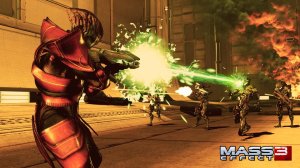
"Hey guys--now listen carefully because this is a crazy idea--but what if we take this Prothean team member, cut him from the game, and then sell him as day one DLC? Nobody would know, and we'd be $21 million richer!"
Still unconvinced? Consider, then, the case of the From Ashes DLC in Mass Effect 3. This was day one DLC (which I’ll talk about shortly) that added a Prothean team member, a Prothean weapon, some new appearances, new missions and a few other features. Some hackers, doing whatever it is that they do, found out that some of the main assets of From Ashes were included on the game disc. At the time of release.
EA and BioWare have retorted that it isn’t the complete pack—which is true—but this begs a bigger question: why is that character even on the disc if it was an independent DLC? Is it possible that, perhaps, they realized they could make money off the DLC by stripping it out of the game and releasing it separately? Evidence indicates that could be likely, as EA reported a 40% attachment rate of the DLC with the game on the first day. I believe the link above does the math: $21 million.
But for the most part, DLC is unobtrusive and limited to menu screens or loading screens telling us it exists. We don’t have characters telling us in-game about some cool adventure we could go on, if we totally give our credit cards over and buy the DLC.
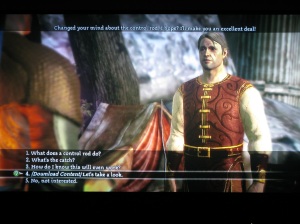
"Sir, if you'll just excuse me as I shatter your immersion in this game world, would you like to give EA more money for some content? I also accept sexual favors for EA employees as payment."
Oh, wait. No, they’ve done that, in DragonAge: Origins. And people were pissed. In that game your party as a camp at which they rest between missions. At that camp are a few NPCs who, when you speak to them, tell you tantalizing tales of treasures and missions. Then, in the middle of this, it stops and asks you if you’d like to buy the associated DLC. A lot of the frustration from gamers wasn’t at the fact that they were selling DLC, but how they did it.
The inclusion of NPCs who are there in the game and want to sell you DLC is innovative in the same way that new date rape drugs are creative. The immersion in the game is shattered, and the NPC has about two minutes of dialogue pulling you into this particular quest before you’re finally informed it will cost extra money. The first time I saw it I stopped playing for a bit, based upon how frustrating that was.
My point is that these three examples—From Ashes, the ME2 DLC and Dragonage: Origins—show that developers and publishers are beginning to push the limits. They are releasing games that, out of the box, are ready for DLC they plan to develop.
It’s conspiracy-minded to say that they’re just stripping parts out of the game that they originally intended to be in it, and I’m not going that far (yet). What I am saying is that they are getting increasingly ballsy about the way they deal with DLC. It used to be additional items that you’d purchase and were shoehorned into the game. Now, you meet characters who tell you that, if you’d only buy this DLC, you could totally go on a sweet adventure. Characters who are fully implemented into the game world, meaning there was a fair amount of time put into this implementation.
It is, really, only a matter of time before the developers realize they can strip parts of the game out and sell them as DLC and nobody will notice.
Day One DLC and Retailer-Specific Bonuses

From Kotaku. If the team was separate, why does your face look like it's lying?! And why was the Prothean even on the disc?!
Day one DLC is content that is ready-to-buy on the day of release. This, to me, is a sign of the way all games are going to be shortly if we don’t do something. Day one DLC is a blatant affront to us, it is releasing a game and saying that, during its development, they spent time working on a DLC but you have to pay more to get it. Soak that in for a minute: while you were waiting for this game to come out, they used some of that time to make a DLC they’re charging separately for. Seriously?
The picture to the right is a developer from BioWare stating that there was a separate team working on From Ashes. Now, he is trying to abate some of the outrage over the assets being on the game disc, but I think this still illustrates something else: why put a separate team to create day one DLC when they could just, you know, work on the game?
Fortunately, most gamers seem to hate day one DLC. But the fact that 40% of people who bought ME3 bought From Ashes shows that it’s still profitable enough to keep doing it. I hate to use slippery slope arguments, but day one DLC is only made possible because we are so accepting of other forms of DLC. It is the developers and publishers pushing their limits, seeing how far they can go before we, the gamers, push back and tell them they’re making us pay more money to get the complete game.
And then there are retailer-specific bonuses, where buying X game from store Y gives you a certain weapon.. When I bought Deus Ex: Human Revolution I got a silenced sniper rifle that was made available to me on the first mission (after the prologue). This first mission starts you off—without a retailer bonus—with a single weapon of your choosing, but no matter what you take they are not the most powerful.
On the other hand, I was given a pistol and then a silenced sniper rifle because I bought it from a certain place. As I made my way through the first mission, I found that the sniper rifle made life easy. I was taking people out, leaving them wondering where the shot came from. It is a jarring experience, and it is not in line with the way the developers wanted the game to be played. Had they intended you to have that weapon from the get-go, it wouldn’t be a retailer-specific item, it would be something in the main game.
This is another affront to the gamers that people haven’t seemed to find issue with. This is the tacking on of some weapon into the game just so that you buy it from a certain store. I couldn’t find an article or source proving this, but anecdotally, I have heard people discussing where they’d buy their game, weighing the pros and cons of what weapon you get.

Buy the new Extreme Jedi Edition of Star Wars Saga only available from Wal-Mart, including this exclusive scene in which Vader reveals that he is, in fact, Luke's father.
This is not the way it was meant to be. Consider movies and how Wal-Mart and Target—always wanting to one-up each other—will release editions specific to their store. However, these editions only have special cases or bonus features. Most people aren’t going to find their movie experience grossly changed by this. The way retailer-specific bonuses are implemented would be, in terms of film, if both Target and Wal-Mart cut specific, but different, scenes from the movie and you only got a certain scene with a certain retailer. It would be disconcerting to watch the movie, knowing you’re missing some scene and that, to truly get all of the scenes, you’d have to buy two movies from two places.
This is what those bonuses do to gamers, and we lay down and take it.
Conclusions
Game developers and publishers are businesses. Don’t get me wrong, I totally understand that. They are in this to make money and creating good games that we like is what keeps us going back to them. (Except EA, they’re like the asshole boyfriend you keep going back to because he has a sweet movie collection.) The thing is, it’s not at all surprising that they’re pushing the limits of DLC to see what they can and can’t get away with. The concept as a whole is relatively new.
But what they’ve pushed toward now, day one DLC, DLC that is necessary to understand the story, and then retailer-specific bonuses, are hurting gaming. Developers are releasing incomplete games that are missing certain things, then forcing you to pay extra money to get full access. Any other medium would fail if it worked on a similar business model, but gamers seem willing to lap this up.
While I use the term “incomplete”, I do not mean it in the sense that they are—yet—ripping content out from the release version of the game and forcing us to buy it. But consider, for example, the conspiracy theory surrounding Mass Effect 3. The theory is that EA and BioWare made an intentionally vague ending to the game, not expecting the mass anger that they encountered. Had their plan worked as intended, they would have released—months later—the Extended Cut Ending DLC for a small amount. In essence, the plan gamers are accusing them of was to leave us with questions so we felt we had to get the new ending DLC.
I want to emphasize that the above is little more than conspiracy theory and conjecture. But that does illustrate a place that DLC is slowly bringing us, and I wouldn’t be surprised if in a few years we see games doing that same thing frequently.

I understand your reluctance to give up Taco Bell. I realize I wasn't thinking--and may have been temporarily insane--when I suggested you give it up.
In my last post about gaming I offered a solution that allowed us to have the best of both worlds, and I’m doing the same here. I think that, to help correct this trend, gamers need to make it economically infeasible for the companies to sell us story-heavy DLC that is necessary to understand the game. If, in the future, you see this kind of DLC released for a price, don’t buy it. Show the companies that the game you buy from them should be the full game.
As far as DLC like weapon or map packs, I offer you two solutions: buy them sparingly or, don’t buy them at all and use the money you save to buy some indie games. That way, you can have indie games, have your COD and still have Taco Bell.
In other words, when you hear of a new DLC coming out, consider strongly if the content it contains is worth sending the message to game companies that they can keep this trend up.
Have heart, gamers. Since the developers and publishers are businesses, if we make ourselves heard we can change the path DLC is taking–and make it work for us.
-
May 22, 2012 at 7:18 pmStop Killing Gaming Part 3: Entitlement, Attitudes Toward Gamers and How We View Our Medium « Tenuous Connections
-
May 22, 2012 at 7:20 pmStop Killing Gaming Part 3: Nobody Takes Gamers Seriously « Tenuous Connections
-
April 16, 2013 at 1:00 pmSix Reasons to Play MechWarrior Online | Tenuous Connections
